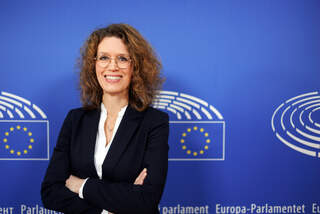
© Andrea Wechsler
"We urgently need to drive forward the reduction of bureaucracy"
What motivates you to get involved as an MEP?
For me, Europe is the realisation of a dream that connects and unites people across borders. What motivates me beyond that are the people who elected me and who see Europe as hope. I want to play my part in ensuring that the EU is a community in which everyone has a voice and in which every decision is based on our shared values and visions.
The challenges we face today are global and complex: climate change, economic uncertainties, digitalisation, migration and social justice. These problems know no borders and require joint action and solidarity. And this is exactly where I see my role as an MEP: I want to actively work towards a future in which these problems are solved together on the basis of European values.
At the same time, I know that our work in Europe often remains hidden and that many important issues receive little attention. However, we deal with essential issues that directly affect people's daily lives - from peacekeeping to energy supply. As an MEP, I want to contribute to making Europe a tangible experience for its citizens.
What do you consider the biggest challenges European companies face in the coming years?
The biggest challenges for European companies in the coming years lie not only in the green and digital transitions but also in adapting to a multipolar world order, including building resilience and cyber security. Given new global centres of power, it is crucial to create a fair ‘level playing field’ in international trade. High labour, production and energy costs also place a considerable burden on European companies, as do the shortage of skilled workers, raw material prices and scarcity. Not forgetting the enormous challenges created by regulation, such as reporting and information obligations.
As a member of parliament, I therefore see it as my responsibility to meet these challenges with a determined policy. We urgently need to drive forward the reduction of bureaucracy and strengthen Europe's competitiveness. Politics and business must pull together in this endeavour: It is about creating a simple, fair and clear regulatory framework that enables innovation and supports companies in their transformation. With drive and optimism, I will do my part to ensure that European companies remain competitive on a global level.
How to #PowerUpEurope: How would you like to use your work in the Industry Committee to make Europe an attractive and strong business location again?
The new legislative period in Europe is focussed on competitiveness. With my industrial policy, environmental policy and labour market policy priorities in three committees, I will devote all my energy to this goal.
This goal of competitiveness is, of course, framed by overarching goals: Promoting peace, European values and the well-being of citizens. For me, this framework is of crucial importance in order to be able to achieve the EU's economic policy objectives in detail.
The issue of competitiveness ultimately ties in with the question of realising a social and competitive market economy, economic and monetary union and the internal market. As a parliamentarian, I have three levers to contribute to this: legislation, budgetary control and parliamentary control of the EU Commission.
I will use all these levers to make Europe an attractive and strong business location. As a full member of the Committee on Industry, Research and Energy (ITRE) - with particular responsibility for energy policy - I am committed to a return to trust-based regulation that favours openness to technology.



